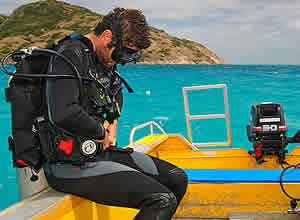
Mr Waldie prepares for a scuba dive off Lizard Island. Image: Tane Sinclair-Taylor
Eager to save shrinking fish stocks and shape the future of their field, two UQ marine biology graduates will soon dive headfirst into a tour of Papua New Guinea.
Peter Waldie and Tane Sinclair-Taylor will join Oceanswatch International next month to analyze the role of Marine Protected Areas (MPAs) in reducing the impacts of overfishing.
Mr Waldie said he wanted to explore and define new opportunities beyond those traditionally occupied by marine biologists in academic, private and government sectors.
"We saw a real opportunity by working with NGOs (non-government organizations) and research groups with an interest in fieldwork in developing countries," he said.
"We aim to reduce the cost of much-needed field research in these countries by utilizing existing networks, and by carrying out multiple projects for leading Australian research groups within each individual trip.
"We can achieve these goals, and dramatically reduce the costs of doing so. Not only that, by bringing the skills and knowledge of these groups together we could also improve the services that each provide."
MPAs include areas known as "green zones" â€" places where fish and other species can flourish without human interference.
"Inside the zones fish are understandably larger and more abundant and these larger fish spill over into fishing areas," Mr Waldie said.
"Larger fish also have more offspring and offspring of higher quality. As most marine fish are broadcast spawners, MPAs are often net exporters of larvae. MPAs may also protect stock genetics from the effects of selective fishing and act as insurance against external stock collapses."
This kind of protection is particularly important in areas like remote PNG, where monitoring is minimal.
Mr Waldie said the trip to Papua New Guinea had been inspired by fellow students who shared a passion for finding new solutions to save our oceans.
During his studies, which included an honors year in 2009, Mr Waldie completed more than 300 dive hours to observe and capture fish, shark, ray and coral specimens for research. Fellow honors graduate Mr Sinclair-Taylor has worked extensively in more than 50 field programs with numerous UQ-based research groups in research assistant and field technician roles.
Both Mr Waldie and Mr Sinclair-Taylor will remain in Papua New Guinea until October before sailing along the east coast of Australia to meet with local research groups to discuss their work.
